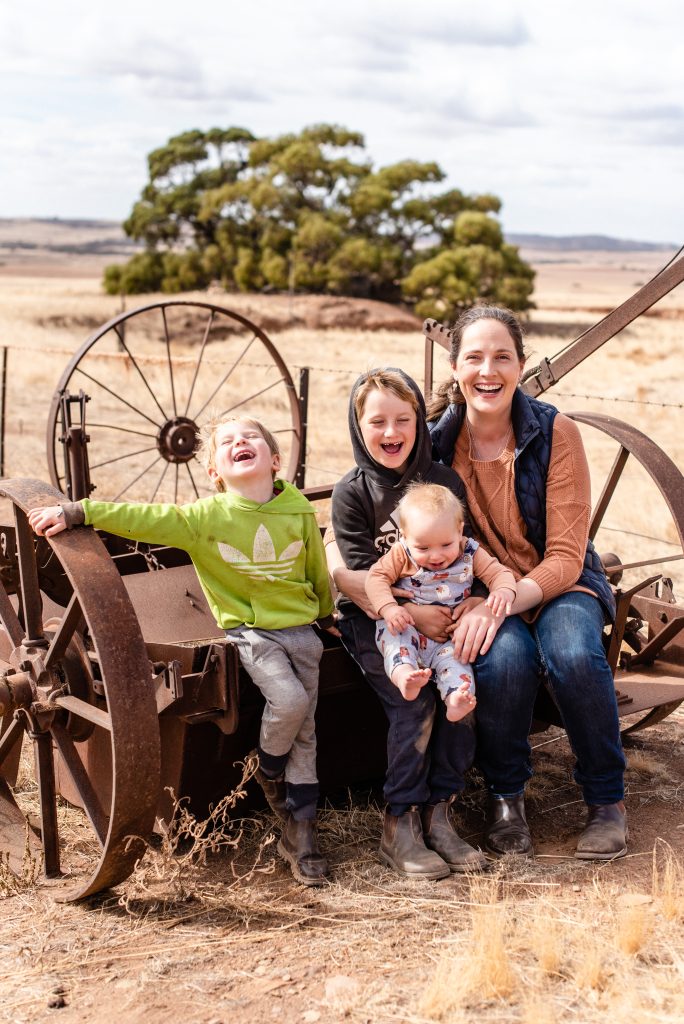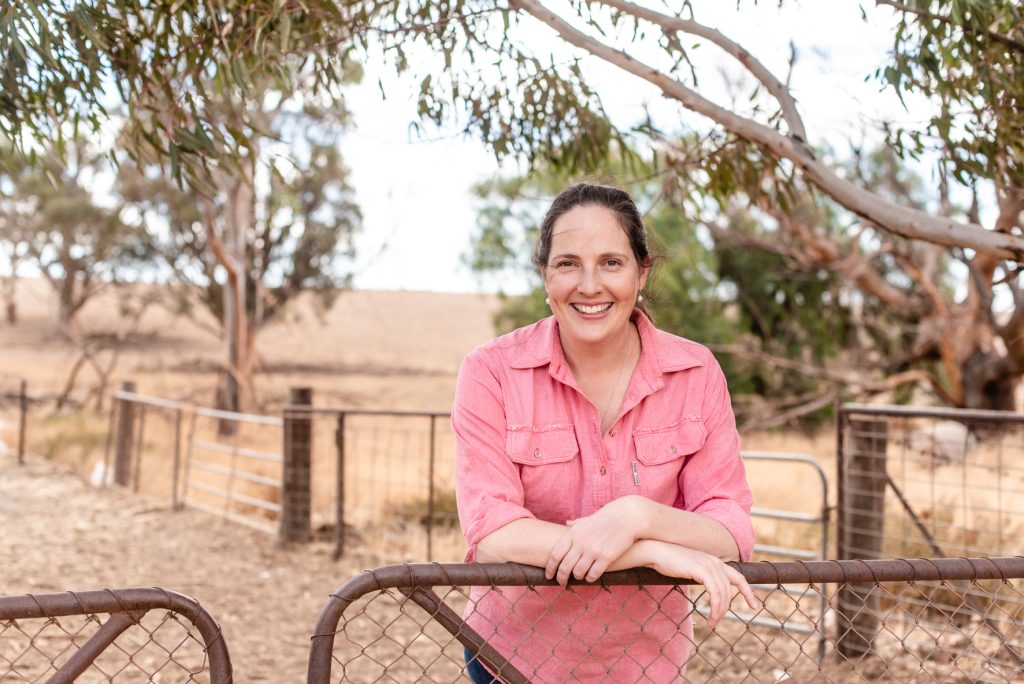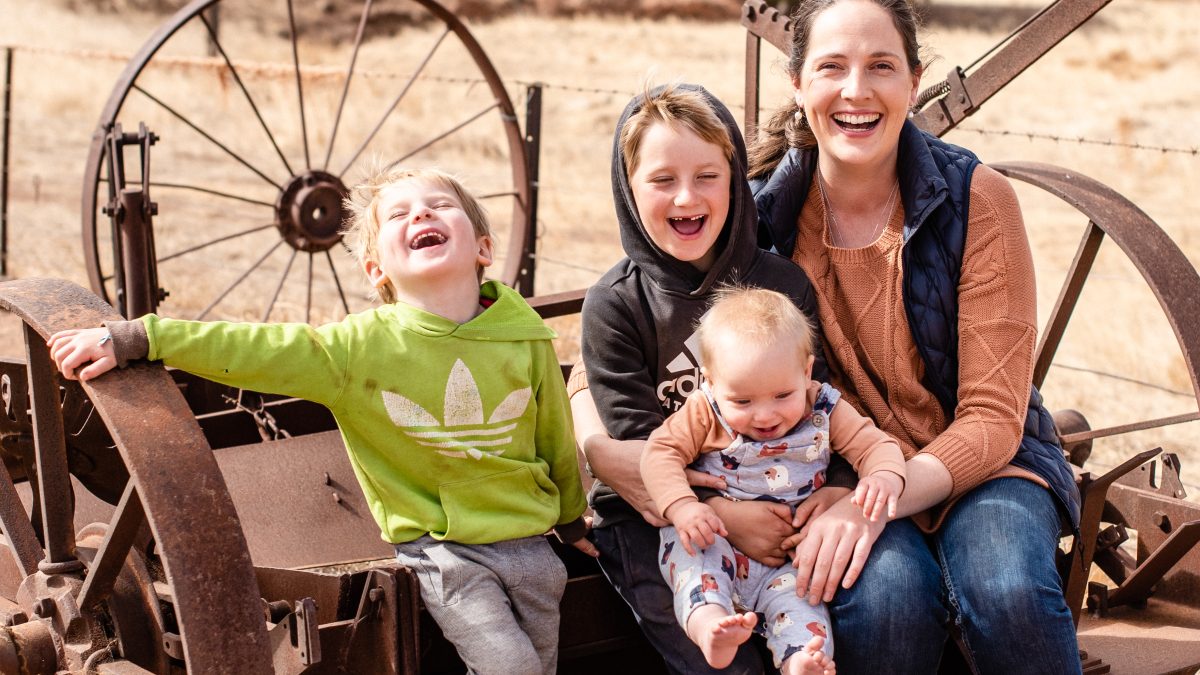
Steph Schmidt is a farmer and Clinical Psychologist from South Australia, who is on a mission to build a thriving Rural Australia by promoting resilience and well-being among farmers and their families.
Raised in suburban Adelaide, Steph was first introduced to farming when she met her husband Simon, while working at a pub when she was 19. After five years of travelling back and forth, she made the move to ‘World’s End,’ located 18 km southeast of Burra, after graduating from University.
Today, Steph and Simon run a large cropping and sheep farm with their three sons, Angus, Ted and Darcy.
Steph knows first-hand the emotional, financial and physical pressures of running a farm and family.
In 2018, they extended their farm and purchased two properties, right before being hit with the severest drought on record. A couple of years later, Steph developed postnatal depression for the second time.
These hardships, along with her background in psychology, made her more determined than ever to make it easier for isolated farmers to access mental health resources in the face of adversity.
In 2020, she was awarded the SA Agrifutures Rural Women’s Award and was able to launch her business “Act for Ag” with the help of a $10,000 bursary.
Steph is now a guest speaker, runs business and community workshops at grower information days and conferences, and offers online coaching sessions to teach participants about psychological resilience.
Steph says this year however, she’s been focusing a lot more on helping rural women.
“Women on farms carry an invisible burden. Stereotypically, women are the supporters of everyone else, and don’t often seek support themselves,” said Steph.
This epiphany led Steph to create an online community called “Navigate for Her,’ a space for women in farming to connect each month.

“My lived experience is that none of us have a whole lot of time to dedicate to doing anything extra, so I try to keep the time commitment as brief as possible, while ensuring women have the chance to connect with other women who understand the juggle.”
Steph says the hardest part about farming is not having control of so many factors.
“Whether it’s the cost of living, interest rate rises and the fact we don’t really control how much our expenses cost or how much we get paid for our food in return.”
She says the best coping strategy is mindfulness.
“When people think of mindfulness, they often think about doing a 20-minute meditation or sitting under a tree, and stopping all thoughts and feeling completely calm and peaceful… but it’s as simple as taking the noticing skills we already have as farmers and applying them to ourselves.”
“In the same way we will head into the paddock and check the quality of the soil and notice we need to add more fertiliser, we need to remember to pause and check in on ourselves, almost like a weather check. Ask yourself, what’s my inside weather like? When we take that moment to pause, we can think about our next steps. It’s so important to step out of auto pilot.”
Steph says while it can be hard to achieve work life balance with such a demanding and unpredictable job, there are so many amazing benefits to life on the farm.
“Being able to involve our kids is amazing. Having them out in the sheds or shearing together, and having them get up in the tractor. It’s about embracing those micro moments that bring us joy. I think we probably get to see a whole lot more beautiful sunrises and sunsets than our city counterparts.”
If Steph could give one piece of advice to someone beginning their farming journey, she would tell them it’s all about being open to navigating and finding the life that works for you.
“Remember, what works for you doesn’t have to be what any of the books tell you or what family, or social media tells you, and it will take time to figure that out.”
To find out more about Steph and the work she does, you can visit her website or follow her on social media @actforag
Photo credit: Meaghan Coles Photography


